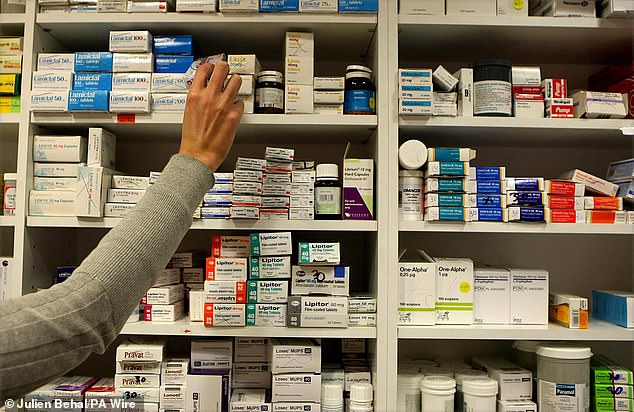Prescription practices for osteoporosis drugs have been dubbed a ‘wild west’ which risks thousands of preventable deaths every year.
A report published by the All Party Parliamentary Group (APPG) for Osteoporosis and Bone Health – which includes MPs, lords and clinicians – found that two-thirds of patients with the brittle bone condition have struggled to get their medication.
Experts say there is a ‘postcode lottery’ caused by a lack of knowledge among many GPs about new medicines.
‘Patients are clearly being let down,’ says Louise Statham, a clinical pharmacist at the University of Sunderland.
‘Patients deserve consistent prescribing, so their postcode does not impact their treatment.’
Osteoporosis affects more than 3.5 million in the UK – nearly two-thirds of whom are women. Many do not realise they have the condition until they break a bone.
The disease causes bones to become so fragile a break can be triggered by a cough or sneeze, and is to blame for half of all women and one in five men over 50 suffering a fracture, most often in the spine or hips.
Janice McKingley, 71, from Leeds, was diagnosed with osteoporosis seven years ago. Early on in her treatment, she was offered a specialist medicine called zoledronate to improve her bone density. However, two years ago, when she moved to Dorset, she was told she was not eligible for it.

Prescription practices for osteoporosis drugs have been dubbed a ‘wild west’ which risks thousands of preventable deaths every year (file photo)
Since then, scans show that her bones have grown weaker.
‘I am worried all the time about having a fracture,’ says the grandmother. ‘It is terrifying having that shadow loom over me, but I don’t know what else to do.’
Preventable fractures as a result of osteoporosis are estimated to cost the NHS £4.5 billion each year, with one million hospital bed days taken up by hip fracture patients alone.
The Royal Osteoporosis Society estimates 2,500 die every year from the debilitating effects of preventable hip fractures.
The damning report by the APPG found that 1.4 million women eligible for romosozumab, a ‘bone-builder’ treatment, are
unable to access it, leaving them at high risk of broken bones.
The injection is most commonly used for postmenopausal women with low bone density.
Women also face barriers for another bone strengthening drug, denosumab, with 1.2million having to wait for specialist appointments despite it being available from a GP.
Research suggests access to these drugs varies hugely depending on where in the country patients are treated.

Preventable fractures as a result of osteoporosis are estimated to cost the NHS £4.5 billion each year (stock photo)
For example, someone in Brighton can access denosumab through their GP, while a patient in Eastbourne, just 20 miles away, has to wait for a specialist appointment. The postcode lottery also disproportionately affects those living in areas of deprivation, despite these people being more likely to suffer debilitating fractures.
According to the Royal Osteoporosis Society, 80 per cent of the 14,000 calls every year to its specialist nurse helpline are from people who are in ‘dire confusion’ about their medication options.
‘This report shows there’s a wild west when it comes to bone drugs in the NHS, which is endangering lives,’ says Craig Jones, chief executive of the Royal Osteoporosis Society.
‘The chaotic patchwork of prescribing practices across the UK is costing tens of thousands of people the treatments they desperately need.’
The report comes after The Mail on Sunday launched its War on Osteoporosis campaign last year, urging the Government to roll out clinics to spot the early signs of osteoporosis.
These clinics, called fracture liaison services, are only in half of hospitals in the UK.
Health Secretary Wes Streeting promised during last year’s general election campaign that creating fracture liaison services nationwide would be one of his first acts in power, but now says this will take until 2030.
Sonia Kumar, MP for Dudley and a former NHS physiotherapist, said: ‘With universal early diagnosis services alongside equal access to bone-strengthening medicine, we can transform the lives of millions of people with osteoporosis across the UK.’
This article was originally published by a www.dailymail.co.uk . Read the Original article here. .


